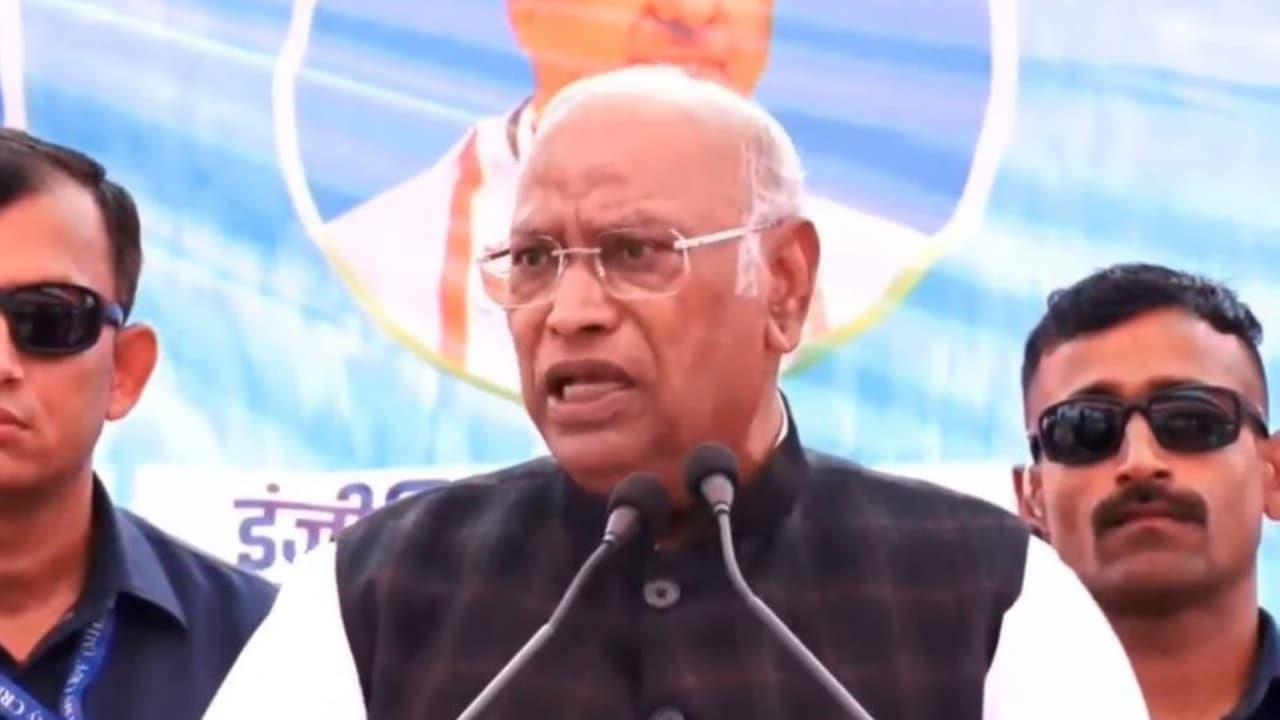
Kharge Blasts 'Hypocrisy' Of BJP, RSS Over Vande Mataram Song
Congress president Mallikarjun Kharge on Friday put the Bharatiya Janata Party (BJP) and the Rashtriya Swayamsevak Sangh (RSS) on blast for celebrating the 150 years of the song while "avoiding" it in its offices, shakas, their own texts or literature despite the song being a popular cry for the Indian freedom struggle.
According to Kharge, the RSS prefers to sing "Namaste Sada Vatasale", a musical prayer rather than India's national song. Comparing it to Congress party's traditions, he mentioned that since 1986 till today, every meeting of Congress, whether a plenary session, or a Block Level meeting, leaders have sung the Vande Mataram.
Kharge Accuses BJP, RSS of Hypocrisy
"It is deeply ironic that those who today claim to be the self-proclaimed guardians of nationalism - the RSS and the BJP, have never sung Vande Mataram or our National Anthem Jana Gana Mana in their shakhas or offices. Instead, they continue to sing Namaste Sada Vatsale, a song glorifying their organisations, not the nation. Since its founding in 1925, the RSS has avoided Vande Mataram, despite its universal reverence. Not once in its texts or literature does the song find mention," Kharge said in an official statement released on the 150 year anniversary of the song.
Kharge's comments come as earlier today, Prime Minister Narendra Modi attended the 150-year anniverasry celebration of the song in New Delhi, where he released a commemorative stamp. Union Home Minister Amit Shah also attended a program in Patna, Bihar, where he announced a nationwide year long campaign.
Criticism Over Role in Freedom Struggle
Criticising the Sangh for its role in the freedom struggle, Kharge mentioned that it is "well known fact" that the RSS supported the Britishers, refused to raise the national flag, abused the Constitution and burnt effigies of Baba Saheb Ambedkar.
"It is a well-known fact that the RSS and Sangh Parivar supported the British against Indians in the National Movement, did not raise the National Flag for 52 years, abused the Constitution of India, burnt effigies of Bapu and Babasaheb Ambedkar, and, in the words of Sardar Patel, were involved in Gandhiji's assassination," Kharge's statement read.
Comparing it with Congress' traditions, he added, "The Congress Party, on the other hand, takes immense pride in both Vande Mataram and Jana Gana Mana. Both songs are sung with reverence at every Congress gathering and event, symbolising India's unity and pride."
Congress as the 'Proud Flagbearer of Vande Mataram'
Talking about the history of the song, Kharge said that it was infact the Congress party which has been the "proud flagbearer of Vande Mataram."
"It was during the 1896 session of the Congress in Calcutta, under the leadership of the then Congress President, Rahmatullah Sayani, that Vande Mataram was sung publicly for the first time by Gurudev Rabindranath Tagore. That moment infused new life into the freedom struggle. The Congress understood that the British Empire's policy of divide and rule, manipulating religious, caste, and regional identities, was designed to break India's unity. Against this, Vande Mataram rose as a song of unflinching strength, uniting all Indians in devotion to Bharat Mata," the Congress chief said.
From the partition of Bengal in 1905 to the last breaths of our brave revolutionaries, Vande Mataram echoed through the land. It was the title of Lala Lajpat Rai's publication, inscribed on flag made by Bhikaji Cama. Terrified of its popularity, the Britishers banned the song which had become the heartbeat of India's freedom struggle, Kharge mentioned.
"In 1938, Pandit Nehru wrote, "For more than 30 years now, the song has been related directly to Indian nationalism. Such 'songs of people' are not tailor-made, nor can they be imposed on the minds of people. They attain the heights by themselves." Therefore, a year earlier, in 1937, the Uttar Pradesh Legislative Assembly started reciting Vande Mataram when Purshottam Das Tandon presided as its Speaker," he wrote.
History of the National Song
Vande Mataram, India's national song, was written originally on November 7 1875 by novelist Bankim Chandra Chatterjee as part of his novel Anandmath. The song was adopted on January 24, 1950, by the Constituent Assembly as India's national song. The Congress too, adopted it as the "National Song of India" in 1937. (ANI)
(Except for the headline, this story has not been edited by Asianet Newsable English staff and is published from a syndicated feed.) Legal Disclaimer:
MENAFN provides the
information “as is” without warranty of any kind. We do not accept
any responsibility or liability for the accuracy, content, images,
videos, licenses, completeness, legality, or reliability of the information
contained in this article. If you have any complaints or copyright
issues related to this article, kindly contact the provider above.

















Comments
No comment